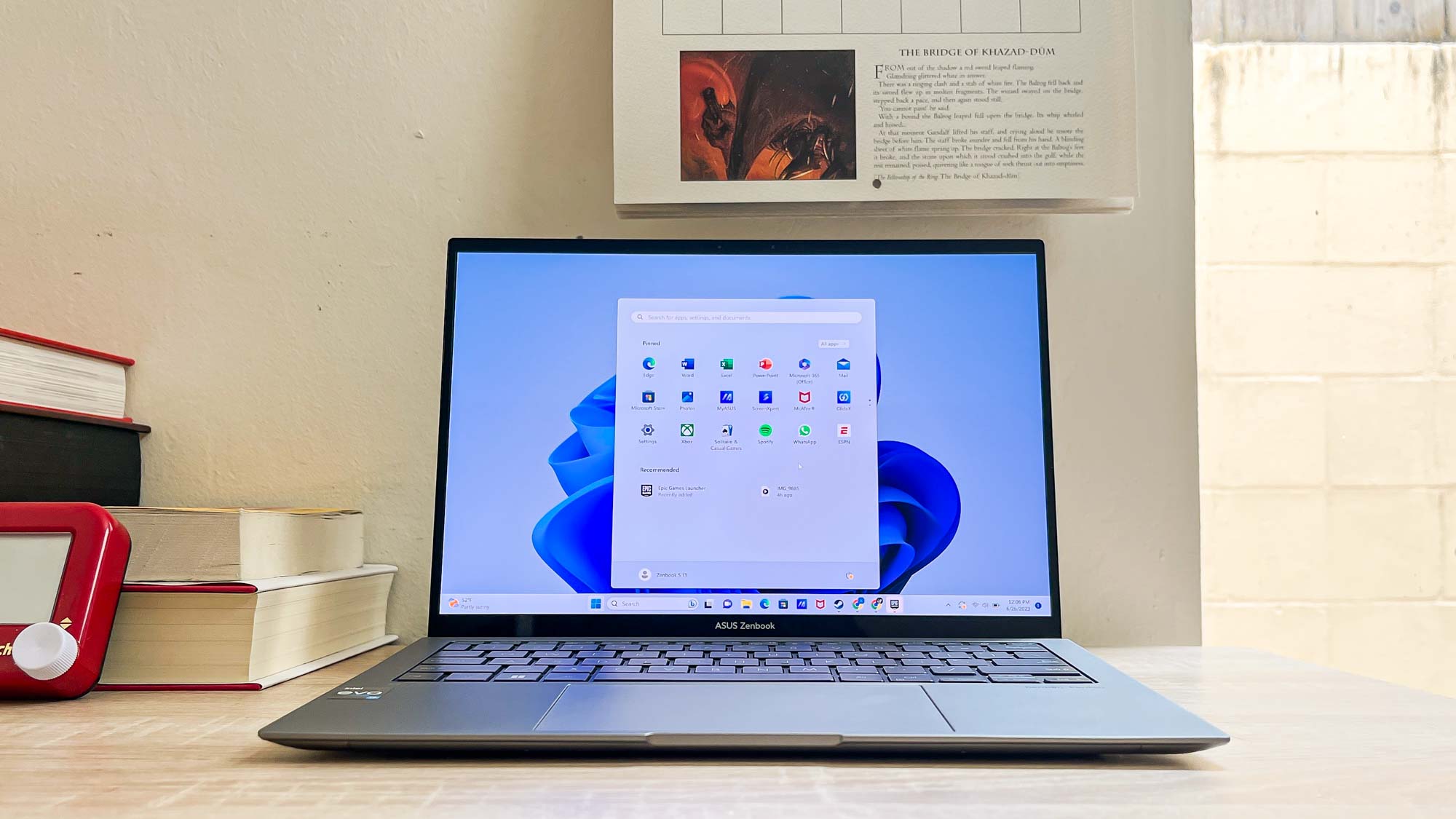
Price: $1,399 as tested
Display: 13.3-inch 2.8K (2880 x 1800 pixels) OLED
CPU: Intel Core i7-1355U
GPU: Intel Iris Xe integrated graphics
RAM: 32 GB
Storage: 1 TB SSD
Ports: (2) USB-C, (1) USB-A, HDMI 2.0, headphone jack
Size: 11.66 x 8.52 x 0.46 inches
Weight: 2.2 pounds
The Asus Zenbook S 13 OLED ($1,199 to start) is a sleek, lightweight Windows 11 ultraportable with a beautiful 13.3-inch OLED display.
If you like the idea of owning a small, well-designed Windows laptop with a great screen and webcam, this Zenbook should be on your radar. After a week of using one I'm confident it's good enough to get you through a day on campus or at the office, but it can't match competing ultraportables in terms of performance or battery life.
That said, the beautiful screen and remarkable portability make this a great little machine for doing basic work, watching movies and playing simple games. The webcam is also quite good, making it nice for remote work and videoconferencing.
But if you want a portable PC to do demanding work or serious gaming, you may want to pick something more powerful from our list of the best laptops on the market. The Asus Zenbook S 13 OLED is one of the best 13-inch laptops for staying productive on the go, but it can't match the best of the best in terms of performance and power efficiency.
I'll walk you through why in this review.
Asus Zenbook S 13 OLED review: Price and configurations
- Only one $1,399 config
The Asus Zenbook S 13 OLED is available for purchase right now from various third-party retailers (including Amazon and Best Buy) linked through the Asus website.
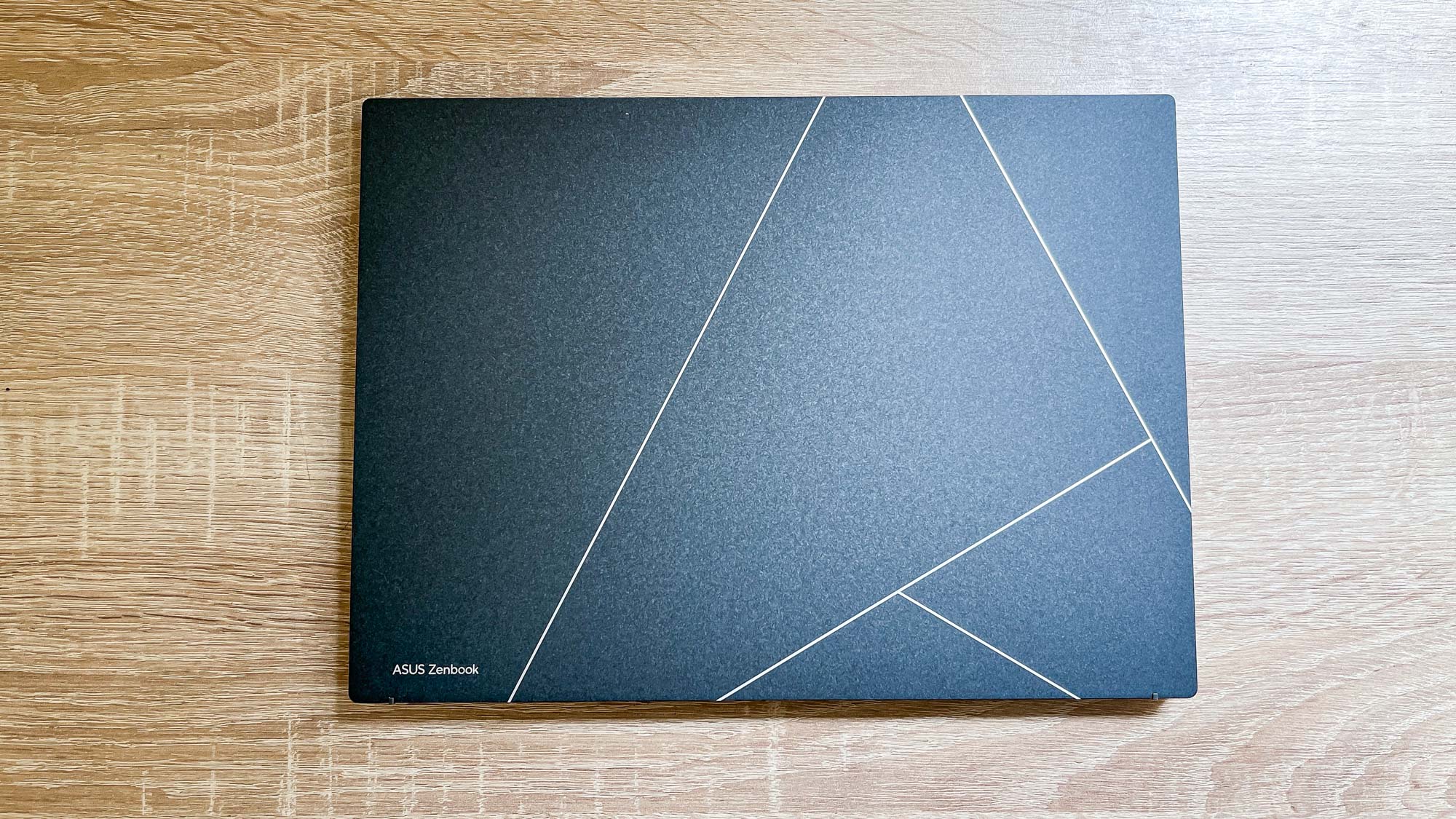
At time of publication it's available in only one $1,399 configuration, which gets you the laptop with a 13th Gen Intel Core i7-1355U CPU, 32GB of RAM and a 1TB SSD for storage. It also comes with Windows 11 Pro.
Asus Zenbook S 13 OLED review: Design
- Thin and light as a MacBook Air
- Appealing design touches on cover and hinge
This ultraportable is lighter than the MacBook Air and just as thin, which is quite a feat."
I really like the design of the Asus Zenbook S 13 OLED, especially the ceramic-coated lid with its eye-catching geometric pattern.
At 11.66 x 8.52 x 0.43 inches and a little over two pounds this ultraportable is lighter than the MacBook Air M2 and just as thin, which is quite a feat. It's also a bit small for my meaty paws, but that's the case with every 13-inch laptop I review. Unlike many of them, the Zenbook S 13 OLED feels light yet sturdy in my hands.
There is some flex in the aluminum chassis when I try to bend the keyboard deck, but not enough that the laptop ever felt weak or unstable while I was using it.
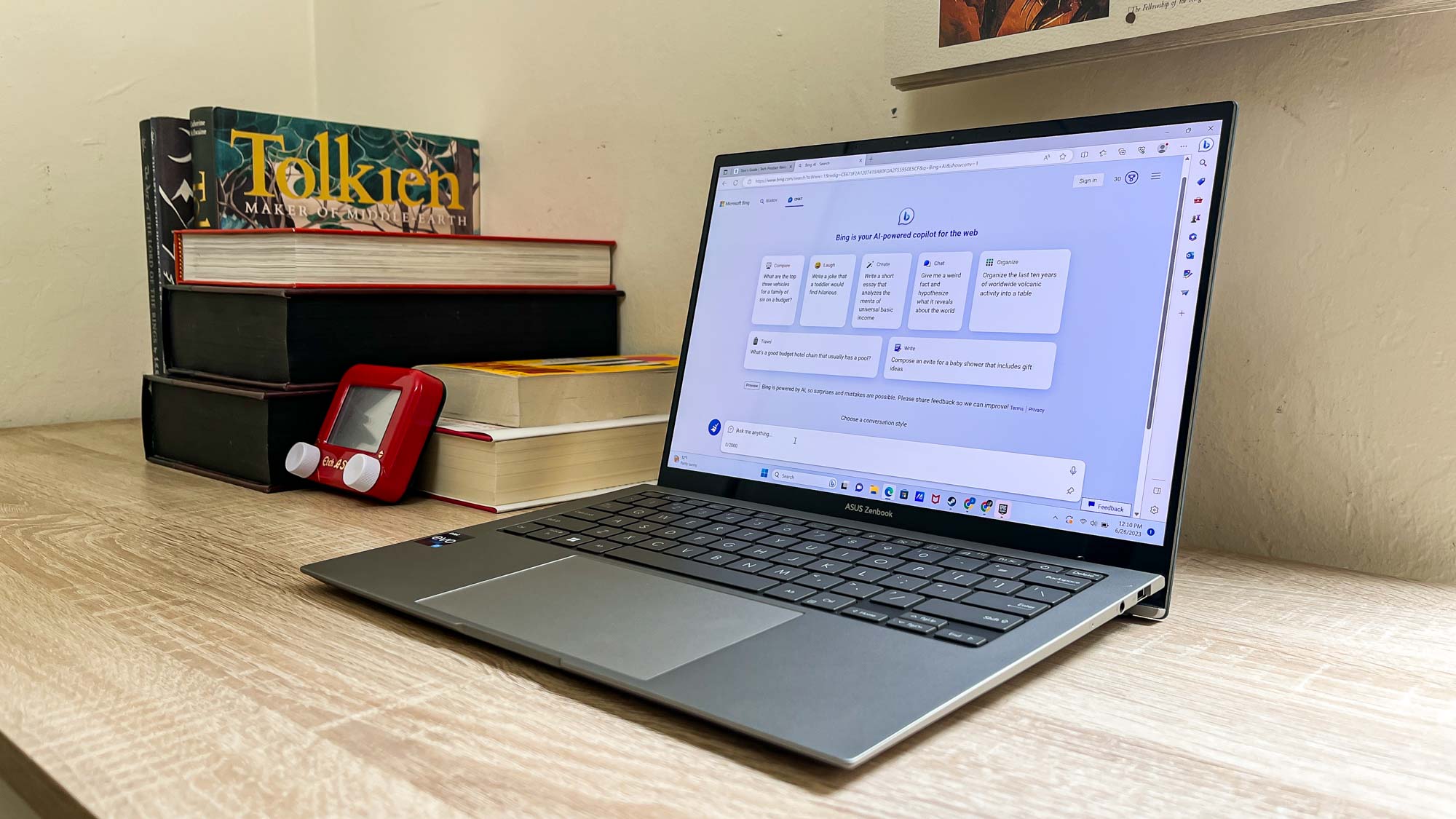
I also like how the laptop raises up slightly when you open it, thanks to the way the hinge pushes the rear of the laptop up off the desk as you lift the screen open. I like the slight angle this gives the keyboard when you're typing, but your mileage may vary.
Asus Zenbook S 13 OLED review: Display
- OLED display looks lush, but underperforms vs. advertised color gamut
- Less bright than competing laptops, noticeable glare on display
The 13.3-inch 2.8K (2,880 x 1,800 pixels) OLED screen on the Zenbook S 13 OLED is one of its big selling points, and in my experience it delivers, as everything I watched or played on the Zenbook looked lovely.
While games like Fortnite dodn't necessarily run well on this laptop they look great doing it, and the colors in films like Space Jam and Sonic the Hedgehog 2 really pop. This display also supports HDR (high dynamic range), which is relatively rare in laptops, so it's a nice platform to use for watching and working with HDR content.
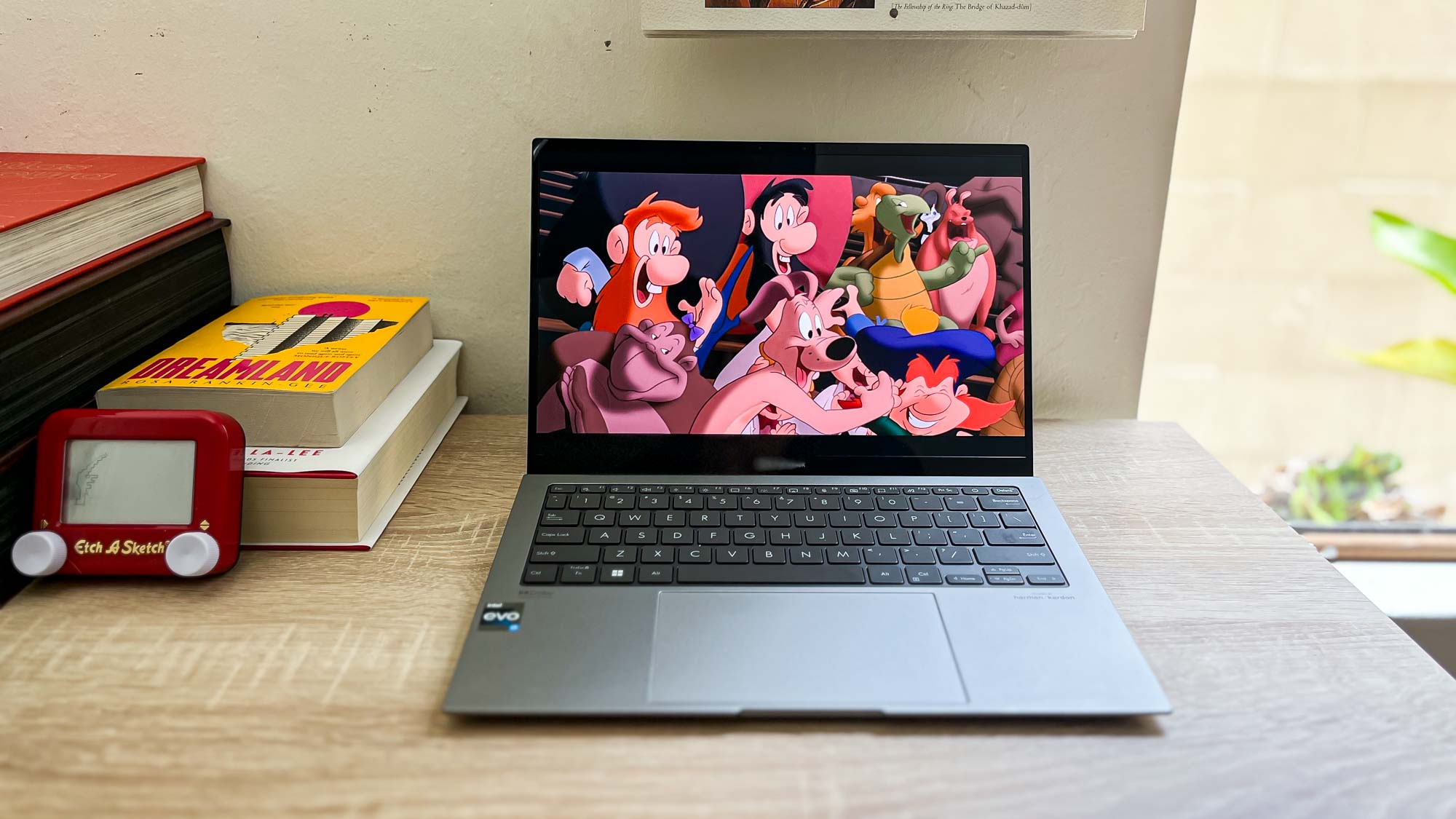
Unfortunately I did notice a lot of glare and reflections coming off the display in brightly-lit conditions, even when I cranked the brightness all the way up. It's hardly a deal-breaker, but something worth knowing if you plan to use this laptop outside a lot — it's not a great experience in direct sunlight.
The results of our display testing back that up, as our Klein 10-A colorimeter reveals the Zenbook S 13 OLED's display achieves an average brightness of 369.8 nits, peaking at 372 nits in the upper-left and lower-right quadrants.
That's bright enough to use it in a variety of conditions well enough, but it can't match the brightness of competing laptops like the XPS 13 or the MacBook Air M2, as you can see from the results chart below.
We also test laptop screens for color accuracy, and the Zenbook S 13 OLED performed well enough in this regard.
We clocked it achieving 106.1% of the sRGB color gamut and 75.2% of the more demanding DCI-P3 color gamut (100% is most accurate, higher tends to mean oversaturated colors) with a Delta-E score of 0.2 (closer to 0, the better).
That's not bad, but that DCI-P3 score is a little disappointing since Asus advertises this laptop as being capable of hitting 100% of the DCI-P3 gamut. Still, these scores are right in line with competing ultraportables, though some (like the MacBook Air) score higher in terms of color gamut.
Asus Zenbook S 13 OLED review: Ports
- Good port array for such a small, thin laptop
- HDMI, USB-A and headphone jack are all nice to see
You don't get a ton of ports on the Zenbook S 13 OLED, which makes sense given how small and thin it is. Still, you get a decent array, which is more than I can say for similarly-sized laptops (looking at you, XPS 13!)
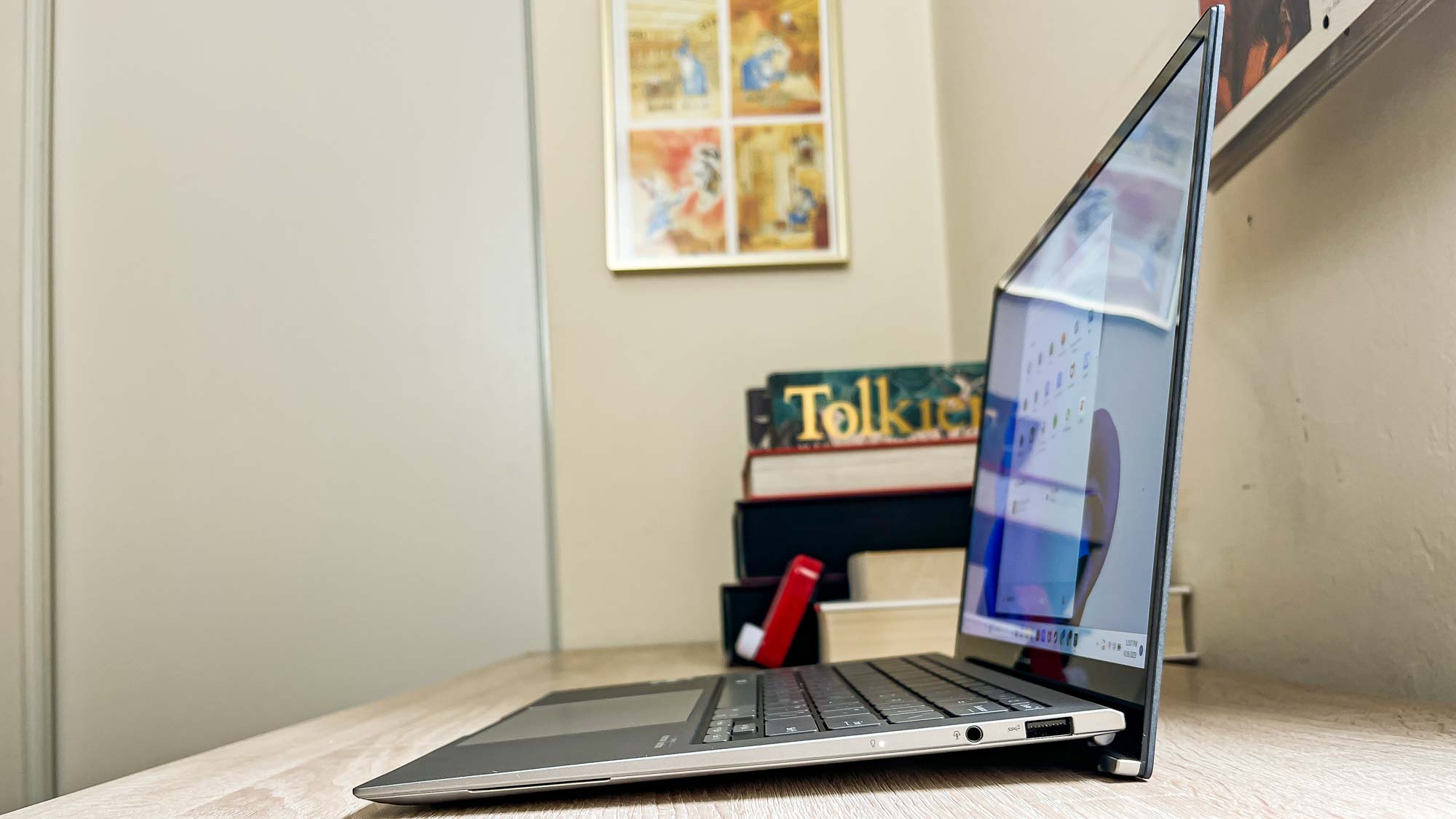
On the right-hand side you have the headphone jack and a USB-A 3.2 port, which is nice to see since USB-A ports are a rarity on ultra-thin laptops these days.
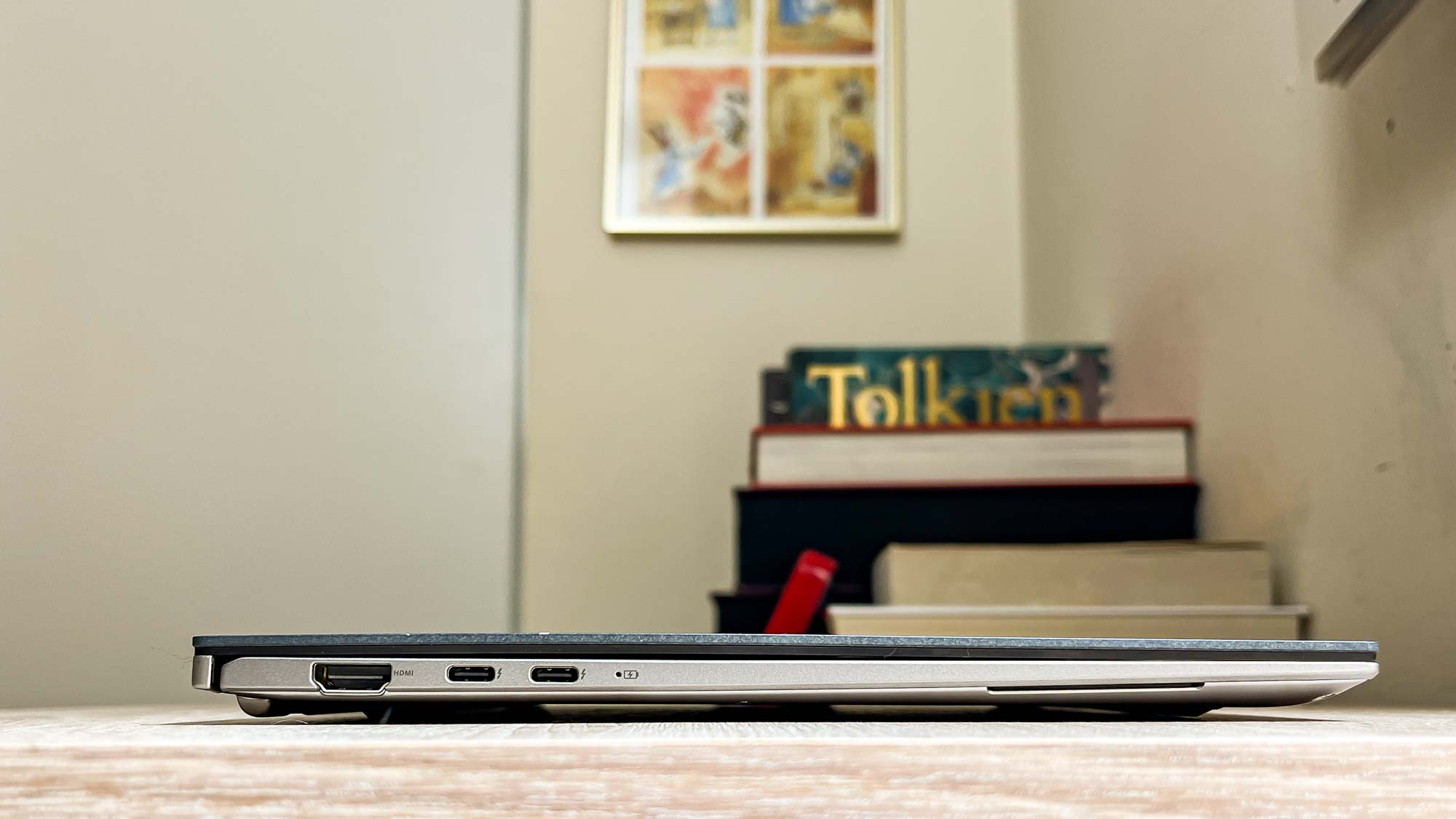
Over on the left-hand side you get a pair of Thunderbolt 4/USB4 ports sandwiched between an HDMI out and an LED that indicates when the laptop is charging.
This is a solid port array for such a small laptop, and it's great to see Asus find a way to squeeze both an HDMI out and a USB-A port in alongside the standard complement of USB-C ports.
Admittedly you do have to use one of those Thunderbolt 4/USB-C ports to charge the laptop, so it would have been nice to see them split across both sides so you have more freedom in how to plug it in.
Asus Zenbook S 13 OLED review: Performance
- Good enough for basic work and light gaming
- Poor performance vs. thicker, beefier laptops
The 13th Gen Intel Core i7-1355U CPU and 32GB of RAM in our Asus Zenbook S 13 OLED review unit give it more than enough power to zip through an average workday.
During the review process I had no trouble tackling day-to-day work tasks with this machine, and it handled my habit of opening and ceaselessly flipping between 30+ tabs and 5 or more apps with aplomb.
However, I didn't have much luck getting many of my favorite games running at decent framerates. You can expect the Zenbook S 13 OLED to play older, slower, and less demanding games quite well, but more modern and graphically-intensive games won't run well or at all.
I could play Fortnite, for example, but the performance was so choppy that it wasn't much fun. I had a much better time playing simpler (though no less enticing) games like Dicey Dungeons, Last Call BBS and NORCO on this laptop, and the OLED display helps them look their best.
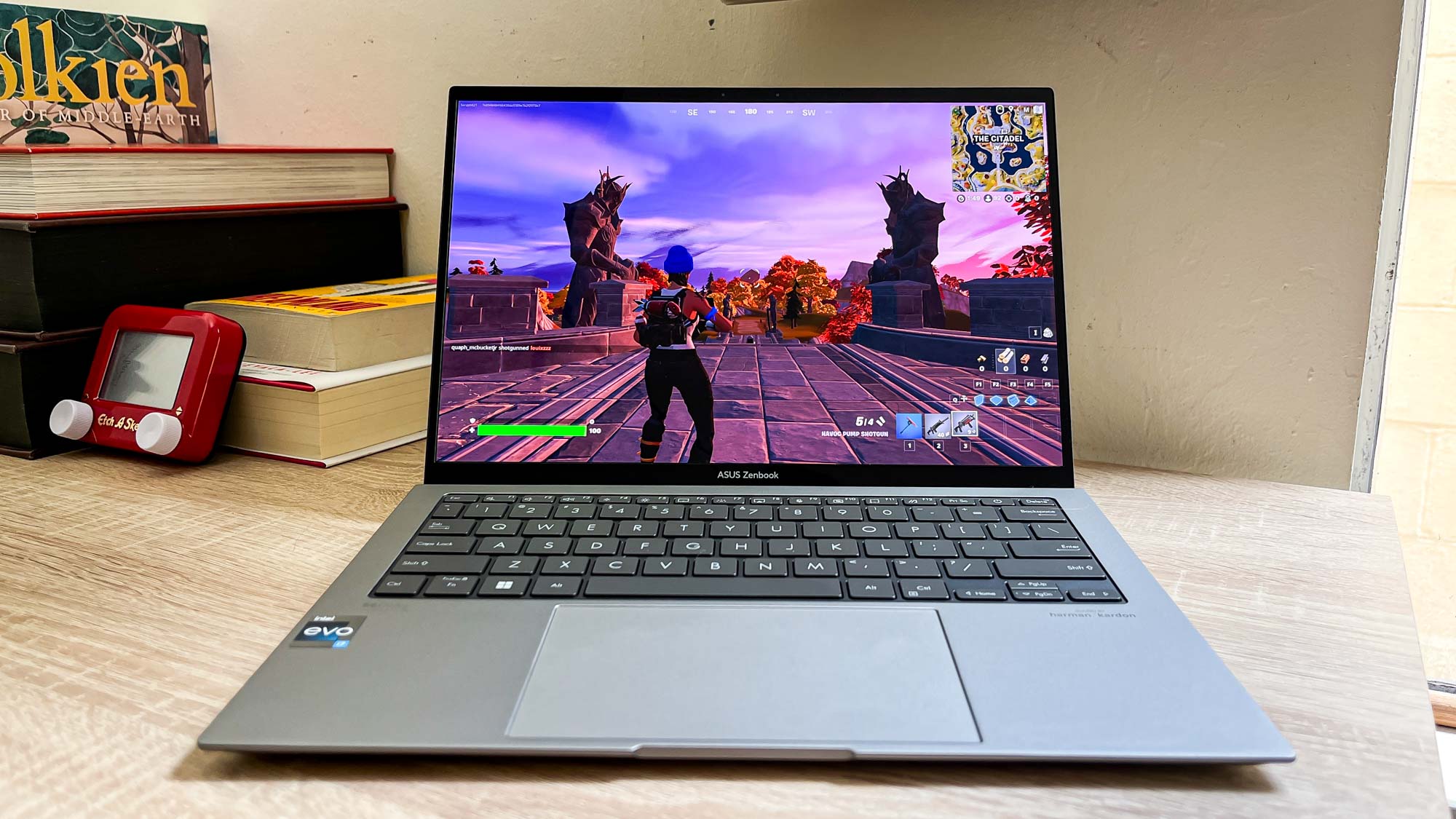
Our performance testing backs up my hands-on experience with this Zenbook, as it did well enough but not outstanding. When we ran it through the Geekbench 5.4 multi-core CPU benchmark it earned a score of 7,482, which is decent for an ultraportable but far from outstanding.
To give you a sense of comparison, that's a bit better than a similarly-priced and -sized ultraportable like the Dell XPS 13 (2022). But, as you can see from the chart below, most competing ultraportables perform better in this test, including the Dell XPS 13 Plus, the Framework Laptop and the Acer Swift 5.
A similar story played out across our other tests. In our drive speed test, which tests how fast the laptop's SSD can move 25GB of multimedia files, the Zenbook S 13 OLED hit a peak speed of 1,257.3 MBps (megabytes per second).
That's not bad, and it's faster than the 2022 Dell XPS 13 managed in the same test. But here again, the Zenbook falls short of competing Windows 11 ultraportables of similar price and size.
When we timed how long it took our Zenbook review unit to transcode a 4K video down to 1080p using Handbrake, it took over 10 minutes (11:16) to complete the task. Again that's better than last year's underwhelming XPS 13, but again we saw significantly faster performance from competitors like the Framework Laptop 13 and the Dell XPS 13 Plus.
Remember how I mentioned this laptop isn't really great for gaming? Our game performance testing backs that up.
We run the Sid Meier's Civilization VI: Gathering Storm graphical benchmark on just about every laptop we review because it runs on such a wide variety of hardware, and our Zenbook S 13 OLED managed to run it at a decent 23 FPS (frames per second).
So while that old game is playable on the Zenbook, it's not exactly an enjoyable experience. And as you can see from the chart of results above, the Zenbook delivers fewer FPS in the same game than premium ultraportables of similar price and size.
Now I have to mention again that if I didn't know most of the laptops I've reviewed in the last year performed better than this Zenbook, I wouldn't have a problem with its day-to-day performance.
In the course of writing this review and conducting my day-to-day work (mostly writing, editing and spreadsheet tasks) it never gave me cause for concern, and while I had to keep my expectations low while gaming, I was still able to entertain myself for hours with my Steam library.
Asus Zenbook S 13 OLED review: Audio
- Good volume, weak bass
The speakers on the Zenbook S 13 OLED ae good but not great, delivering more than enough volume for day-to-day listening but lacking enough bass and depth that you'd want a pair of great headphones to really enjoy your music.
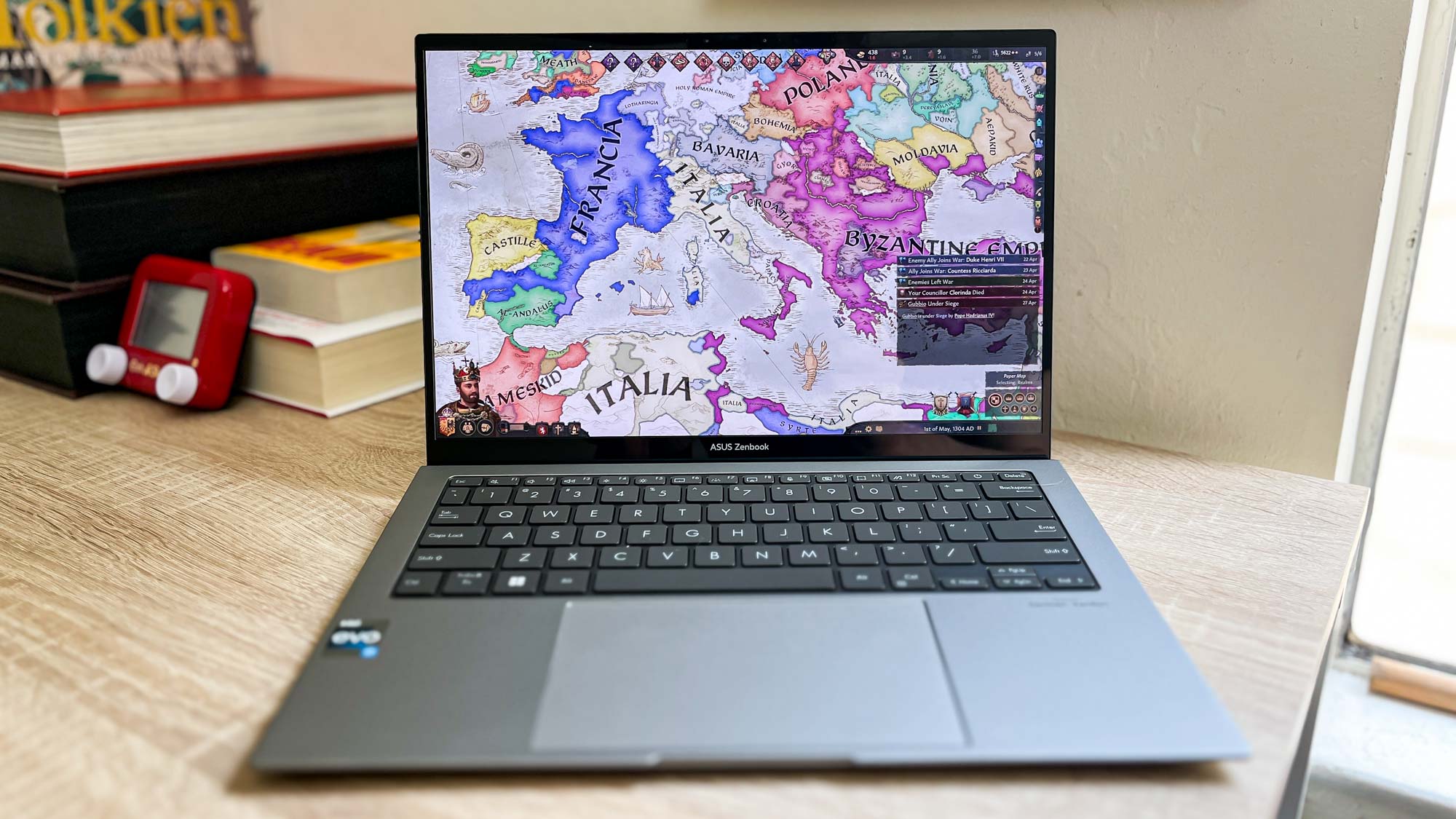
That said, the laptop's speakers support Dolby Atmos and bear the Harman Kardon seal of approval. Asus claims it's designed a special Smart Amplifier system that helps this laptop get loud, and in my experience it does indeed.
I spent hours listening to work playlists alongside tracks from artists like Kamaiyah, The Mountain Goats and Open Mike Eagle on this laptop, and they sounded as good as usual piping out of its speakers. I think the sound quality is a little tinny, especially when you crank the volume all the way up, and the bass is basically nonexistent, but the speakers on this laptop are more than capable enough for casual listening.
I will add, however, that I had to fire up the Realtek Audio Console and disable the "Speaker noise cancellation (voice call)" feature (you can also do this via the MyAsus app) in order to use the speakers at all during videoconferencing calls.
Before I figured that noise cancellation tech was to blame I was losing my mind in Google Meet calls as my colleagues intermittently sounded like rusty robots talking or cut out entirely, sometimes for 15 seconds or more. So if that happens to you, check to make sure noise cancellation is switched off before you call tech support.
Asus Zenbook S 13 OLED review: Keyboard and touchpad
- Keyboard surprisingly satisfying given its small size
- Touchpad works well
The keyboard on the Asus Zenbook S 13 OLED is small but remarkably usable for my big hands, in part because the keys feel large and satisfying to type on.
While the amount of travel you get while pressing each key is pretty low (I'd guess about 1mm or slightly more), there's a nice clicking sensation that blunts the disappointment you feel when your fingers strike the deck after each stroke.
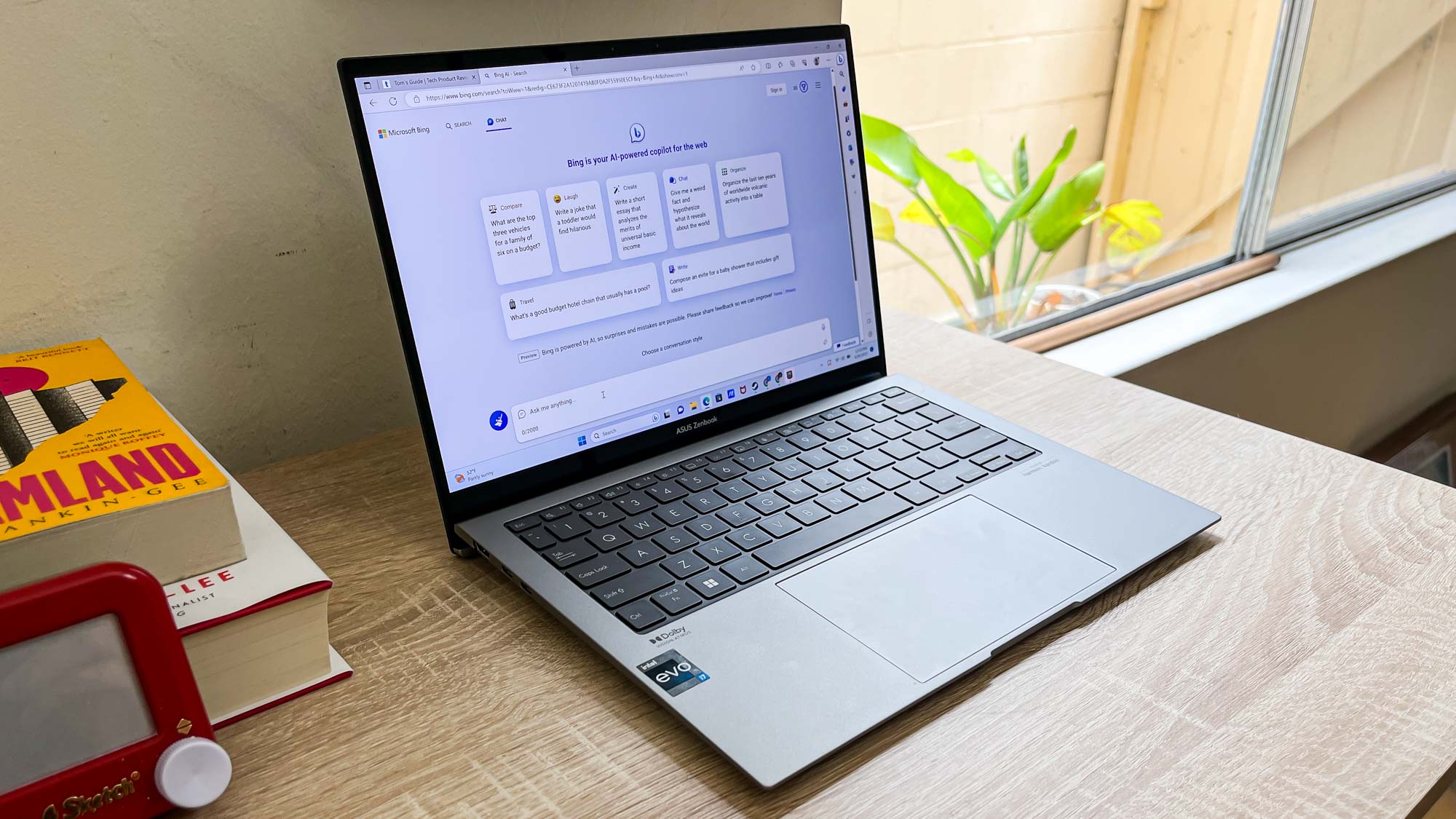
The touchpad is centered beneath the keyboard and is nothing to write home about, which is generally good when discussing touchpads. In my experience it's not too small (which can annoy) or too large (which can cause accidental clicks and drags), and it had no trouble accurately registering all my swipes, taps and gestures.
Asus Zenbook S 13 OLED review: Webcam
- 1080p webcam captures sharp, accurate images and video
- IR included for Windows Hello support
The 1080p webcam built into the top bezel of the Asus Zenbook S 13 OLED's display is quite good, in my experience. I was impressed with how good it made me look during my weekly video calls with colleagues, and I never heard any complaints from them about my audio quality.
There's also an IR sensor in the camera module so you can take advantage of Windows Hello, which lets you log into your PC via your face once you set up facial recognition.
Asus Zenbook S 13 OLED review: Battery life and heat
- 9 hours of tested battery life is good but not great
- Laptop gets surprisingly hot under heavy load
Our Asus Zenbook S 13 OLED review unit lasted just over 9 hours in our battery rundown test, which tasks the laptop with endlessly surfing the web via Wi-Fi until it runs out of juice.
A 9-hour runtime is good enough, and it means you can likely count on this laptop to last you through a day of work without having to charge it. But our battery test is run with the laptop's brightness set to 150 nits, and that's not actually very bright, so it's likely that you'd get less out of the battery when you're working with the brightness cranked up and swapping between lots of apps.
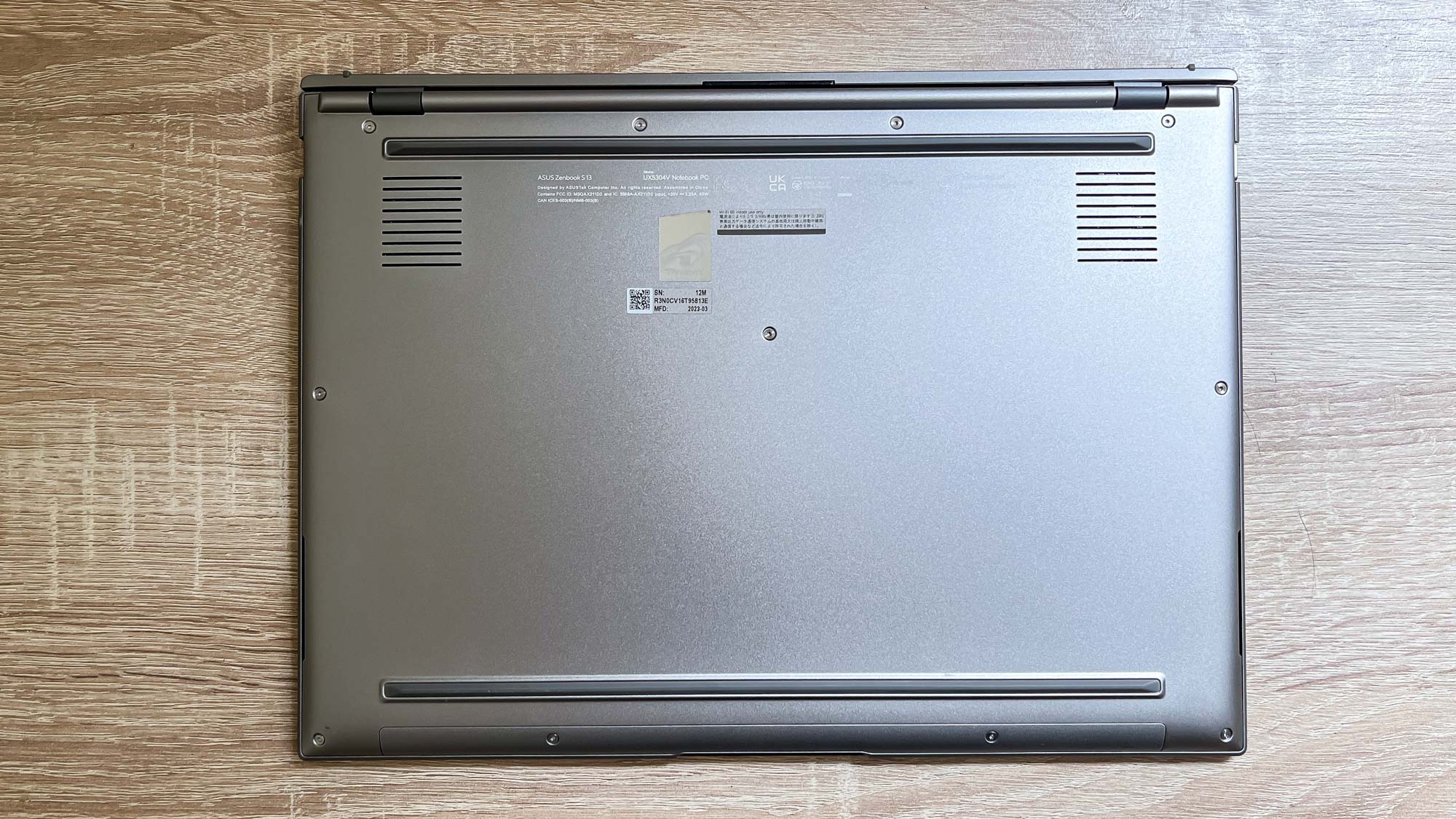
I never noticed this laptop getting uncomfortably hot while in use, but in our heat test (which scans the laptop with a heat gun after it's been playing an HD video for 15 minutes) it got a bit toasty. Our Zenbook S 13 OLED got as hot as 81 degrees on the touchpad, peaking at 115.3 degrees in the center of the underside.
So while I think you'll be fine using this notebook on your lap, be prepared to relocate it to a nearby desk or cushion during heavy use.
Asus Zenbook S 13 OLED review: Software
- Windows 11 Pro comes standard
- No bloatware worth worrying about
The Asus Zenbook S 13 OLED arrives with a copy of Windows 11 Pro installed and not much else.
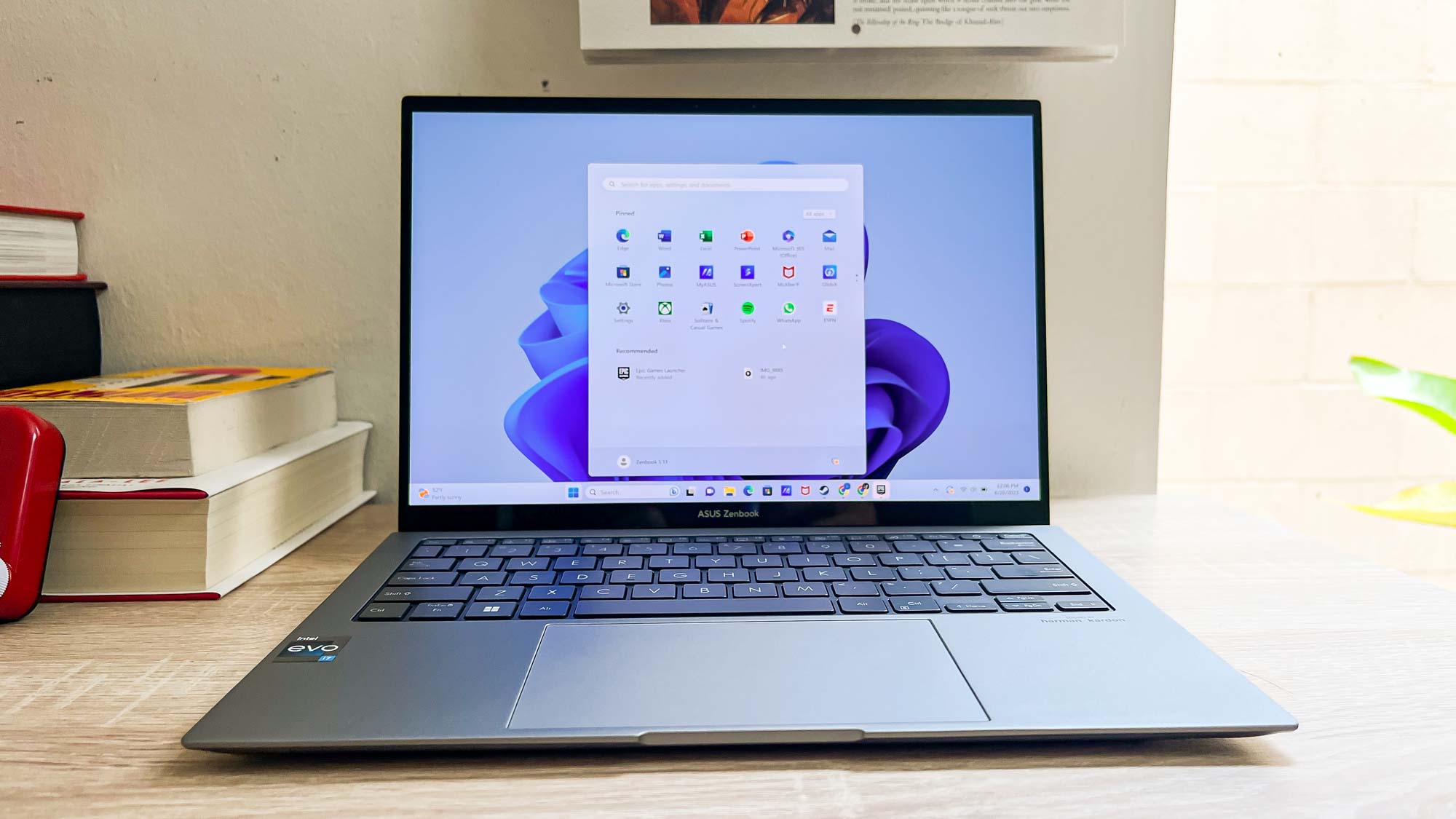
In addition to utility apps like Intel Unison and the Realtek Audio Console, the piece of software you want to pay attention to is MyAsus.
MyAsus is the control app for your Asus Zenbook, and you can use it to do things like look up your serial number, adjust battery and sound profiles, tweak display settings or run OLED pixel care routines, and more.
Asus Zenbook S 13 OLED review: Verdict
There's a lot to like about the Asus Zenbook S 13 OLED at its $1,399 asking price.
The sharp webcam, beautiful display and great port array (for a 13-incher) make this a solid laptop for getting work done on the go, especially when you factor in the eye-catching design and incredibly light weight. In my eyes it dethrones the current Dell XPS 13 as my top recommendation for Windows fans seeking a MacBook Air competitor.
However, you sacrifice a lot to get a laptop as thin and light as the Zenbook S 13 OLED at this price. I'm surprised at how poorly it scored in our display and performance tests, and there are many better options if you don't mind a thicker, heavier laptop.
The OLED-equipped Dell XPS 13 Plus is more expensive and offers worse battery life but better performance, for example, whereas the Framework Laptop lacks an OLED option or a sleek design but is a more capable, longer-lasting productivity machine. And of course, if you're willing to go a bit larger the Acer Swift 5 is an excellent 14-inch Windows laptop that beats the Zenbook S 13 OLED on just about every benchmark.
But if you want a slim, light OLED-equipped Windows ultraportable with enough power to get you through the day for under $1,500, the Zenbook S 13 OLED is a great choice.







